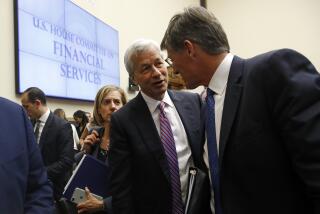After Taking a Beating, Simon Cuts His Losses Like Many Investors
SACRAMENTO
The lights burned late at Kinko’s. OK, so Kinko’s is hardly historic and hallowed--not like the White House or even the governor’s office. But Sunday night, it was the ideal meeting place for Bill Simon’s strategists.
Simon had given the “go.” Roll the copy machines.
Crank out 20 sets of Simon income tax returns, 11 years’ worth--each set roughly 1,300 pages, bound in two volumes the size of city phone books.
Crank ‘em out for nine hours, until 3 a.m.
Here reporters, you want these “released”--you got ‘em. For two hours only. And they must stay in the room. Just one reporter per newspaper. No help from any private accountant. Write on only the notepads we supply.
A very clumsy “release,” creating more bad press for the Republican gubernatorial candidate.
Two visions came to mind.
First from the written Simon announcement, which began: “Copies of Mr. Simon’s tax returns will be available for reporters to view....” I envisioned being invited to a visitation of the campaign corpse. This campaign, after all, has been in critical condition.
The second vision was a nightmare from the past: sitting in a school library, head in some nonsensical textbook, taking laborious notes.
Truth is, the restrictions almost immediately were eased, contrary to news reports.
The one-reporter limit was dropped. Reporters were given all the time they needed. In fact, I’m told the returns will be available throughout the campaign.
The notepad rule was aimed at keeping us from copying Simon’s figures onto blank tax forms. Maybe they’d get peddled later as the originals.
The stay-in-the-room rule is in line with how previous rich candidates have released their tax returns--candidates like Democrats Al Checchi and U.S. Sen. Dianne Feinstein. They basically agreed with Simon chief strategist Sal Russo, who told reporters Monday: “I don’t think you’d want your taxes flying around on the Internet or hanging out on street corners.”
Yes, the tired argument goes, but I’m not running for governor.... Voters need to know whether a candidate has paid his fair share.
As I opined three months ago, judging “fair share” is the role of the Internal Revenue Service and Franchise Tax Board. A person’s tax return--even a politician’s-- should be solely the business of the taxpayer and tax collector. Or a lender or a court.
Next thing, political opponents and the news media will be demanding that a candidate release his school grades. Disclose whether he has any congenital disease. Report the miles per gallon of his vehicles. Aren’t these facts necessary to determine ability and attitude?
Actually, the public can learn a lot about a politician’s investments and potential conflicts from his required statements of economic interest.
Moreover, there has been nothing to pop up yet in Simon’s personal tax returns that appears damaging. His tax damage comes from other sources:
* The IRS recently fingered Simon as one of several businessmen who have used offshore tax shelters it suspects may be illegal. That rare disclosure was “inexcusable,” the IRS and U.S. Treasury Department since have admitted.
* Gov. Gray Davis Wednesday began running a TV ad that claims Simon “siphoned excessive [management] fees” from the family’s nonprofit charitable foundation. This information came from a San Francisco Chronicle report, which was based on readily available public records required of nonprofits.
So the release of personal tax returns is more about playing political defense than disclosing useful information.
But Davis and Simon are throwing dirt bombs in an increasingly nasty political game. And as I noted last week, this is not a climate--amid corporate scandals, collapsing stock market, Simon shelters--that is hospitable to a businessman-investor standing on the principle of “personal privacy.”
Even if Simon could passionately articulate that principle, which he never did.
And so Sunday morning, Russo phoned Simon and advised that he--like millions of stockholders--cut his losses. Let go of those returns. Client didn’t argue with consultant.
Call Kinko’s. They’ve got binding machines. Open 24 hours.
Go at night to guard against any pesky civilians filching documents. Russo personally oversees the copying. “I’m the only one who had seen them, and I felt a duty to protect their integrity.”
Politically, he adds, “maybe now we can go back to where we were before this disruption. Back to talking about the economy, education and quality of life--water, power, roads.”
Maybe. Hopefully.
And we should all listen. But Simon will need to say something--with passion and conviction--worth hearing and remembering. Worth copying down.
More to Read
Get the L.A. Times Politics newsletter
Deeply reported insights into legislation, politics and policy from Sacramento, Washington and beyond. In your inbox three times per week.
You may occasionally receive promotional content from the Los Angeles Times.











